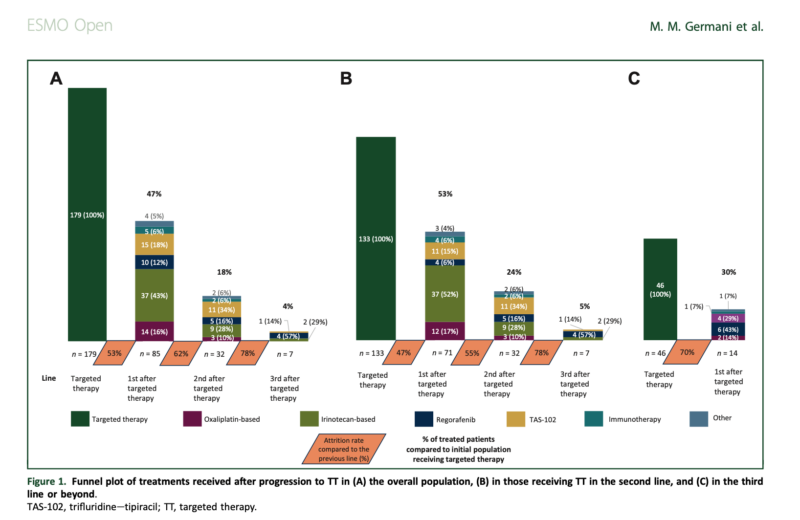New Paper Alert: Exploring Treatment Strategies After Progression to BRAF V600E-Targeted Therapy in Metastatic Colorectal Cancer: A Real-World Analysis
Authors: M. M. Germani, G. Vetere, F. Santamaria, R. Intini, F. Ghelardi, M. Bensi, A. Boccaccino, A. Minelli, M. Carullo, P. Ciracì, A. Passardi, S. Santucci, R. Giampieri, M. Persano, E. Fenocchio, A. Puccini, S. Lonardi, F. Pietrantonio, L. Salvatore and C. Cremolini.
Published in ESMO Open, on April 12, 2024
Introduction:
Metastatic colorectal cancer (mCRC) with BRAF V600E mutation presents significant treatment challenges due to its aggressive nature and poor prognosis. Representing approximately 4%-9% of all mCRC cases, this subgroup often exhibits resistance to conventional chemotherapy. Current treatment protocols involve a combination of cytotoxic regimens and targeted therapies, particularly in patients without mismatch repair deficiencies who may benefit from immunotherapy. Despite advancements, such as the targeted therapy duo of encorafenib and cetuximab validated by the BEACON CRC trial, a majority of patients experience disease progression, highlighting a critical need for effective subsequent treatment options. This real-world study aimed to investigate the subsequent treatment strategies, their feasibility, and clinical factors affecting prognosis after TT failure in BRAF V600E-mutated mCRC.
Methods:
- Retrospective cohort study of BRAF V600E-mutant mCRC patients who experienced progression during or after encorafenib plus cetuximab ± binimetinib targeted therapy (TT)
- Patients received TT in a real-world setting at 21 Italian institutions between May 2019 and April 2023
- Initially, binimetinib was recommended in combination with TT until January 2020; subsequently, treatment was streamlined to only the encorafenib plus cetuximab doublet.
- Data Collection: Focused on the types and efficacy of treatments administered post-progression from initial TT.
- Primary Endpoints:
- Progression-Free Survival (PFS): Measured from the initiation of each line of treatment after documented progression.
- Post-Progression Survival (PPS): Measured from the time of progression on TT until death or last follow-up.
- Statistical Analysis:
- Utilized Kaplan-Meier estimates to analyze survival data.
- Cox proportional hazard models were used to evaluate the influence of clinical, molecular, and pathological factors on survival outcomes.
What We Learned:
The study included 179 patients with BRAF V600E-mutated mCRC who received targeted treatment(TT). Of these, 85 (47%), 32 (18%), and 7 (4%) patients received at least one, two, or three lines of treatment after TT, respectively. Patients receiving TT in the second line were more likely to receive at least one subsequent therapy (53%) compared to those treated with TT in the third line or beyond (30%; P<0.0001). Notably, patients treated with TT earlier in their disease course achieved longer postprogression survival (PPS), which remained significant in a multivariate analysis (HR 0.53, 95% CI 0.34-0.83; P<0.01).
Key Highlights:
- Irinotecan- and oxaliplatin-based regimens were the preferred options after TT failure (43% and 16%, respectively), followed by trifluridine-tipiracil (15%) and regorafenib (12%).
- Among 62 patients with proficient mismatch repair/microsatellite stable (pMMR/MSS) tumors receiving treatment after TT, combinatory chemotherapy plus anti-VEGF was associated with longer progression-free survival (PFS) and PPS compared to trifluridine-tipiracil or regorafenib (mPFS: 2.6 vs. 2.0 months, P=0.07; mPPS: 6.5 vs. 4.4 months, P=0.04).
- The presence of ascites at the time of progression to TT was an independent predictor of shorter PPS (HR 1.62, 95% CI 1.09-2.41; P=0.02).

Key Takeaway Messages:
- Administering targeted therapies as early as possible in the treatment continuum of BRAF V600E-mutated mCRC is crucial, as it allows a higher proportion of patients to receive subsequent therapies and achieve better outcomes.
- For patients with pMMR/MSS tumors who progressed after targeted therapies, combined chemotherapy plus anti-VEGF appears to be the preferred treatment strategy, outperforming trifluridine-tipiracil or regorafenib.
- Accurate selection of patients and molecular profiling, particularly liquid biopsy to assess resistance mechanisms, may be helpful to guide potential TT rechallenge or continuation strategies after disease progression, as suggested by emerging evidence.
Summary by Amalya Sargsyan, MD
About OncoDaily
OncoDaily was founded in 2023. It is a US-based oncology media platform, which features the latest news, insights, and patient stories from the world of oncology. Within a short period of time it became one of the leading oncology media platforms globally.
OncoDaily gathers content from various sources, including social media posts from renowned oncologists from all over the world, news from oncology societies and cancer centers, patient and survivor stories, and career-related information for professionals.
The mission of OncoDaily is to empower patients, survivors, and professionals with the knowledge and inspiration they need to fight cancer. The motto of OncoDaily is “Cancer doesn’t take a day off – neither do we.”


